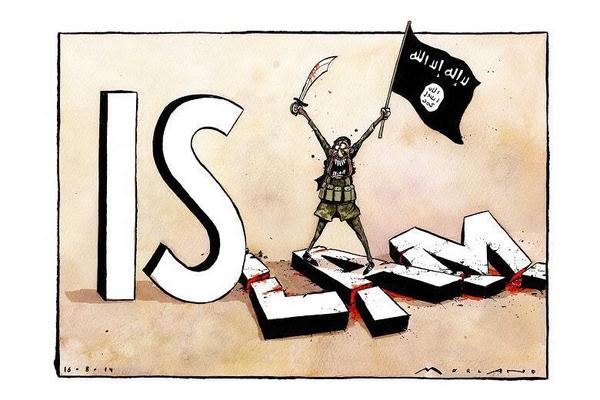THE
notion that the Islamic State (ISIS), or Da’ish, would not extend its reach to
South Africa has proved a false one. ISIS, which controls swathes of Iraq and
Syria, has persuaded thousands of gullible youths from all over the Muslim
world to migrate to its self-declared Caliphate.
This
breakaway group from Al-Qa’idah has turned Islamic extremism on its head.
Unlike Al-Qa’idah, which has focused on a “distant enemy” from caves and
compounds, ISIS controls actual territory and has an active militia.
And whilst
Sunni scholars world-wide have condemned ISIS for its heartless parody of
Shari’ah, or Sacred Law, and its notion of an “Islamic State”, it has not
prevented it from becoming an ideological reality bolstered by extensive social
media support.
Its
online magazine, Dabiq, presents a glowing depiction of jihadist utopia. But
the gloss disappears when the Caliph urges Muslims to rise up and kill
“crusaders” (Christians and Jews).
Essentially,
ISIS’ message is that Islam is under threat everywhere; the world is a Dar ul-Harb, a place of hostility, and
ISIS offers the only Dar us-Salam, or
refuge. “If you don’t agree with us, you’re against us” is the gist of the
worldview, which means that as a Muslim if you disagree with ISIS you become a kafir – an unbeliever whose blood, in
their eyes, it is permissible to spill.
ISIS
also promotes an apocalyptic vision of Syria, and claims that it is waiting for
the end days and the final Islamic Armageddon when a leader, the Imam Mahdi,
will appear.
ISIS
rose after 2003 – and the US invasion of Iraq – as an Al-Qa’idah affiliate led
by Abu Musab Al-Zarqawi. He was a Jordanian jihadist with a criminal record,
who refused to swear allegiance to Usama Bin Laden, and whose brutality even
stunned Al-Qa’idah.
The
rot was started by the Bush administration when Paul Bremer, the US
presidential aide in Iraq, fired 250, 000 civil servants and government forces.
Bush’s incompetence in then imprisoning many Iraqi officials created a
political sinkhole into which the whole region collapsed as Iraq disintegrated.
Interestingly,
General David Petraeus – who was sent to Iraq in 2007 as “Mr Fixit” – told the
Assad regime that its sponsorship of a Salafi insurgency to undermine the US
would come back to haunt it. Nouri al-Maliki’s government (2006-14) caused
further resentment when he condoned Shi’ah sectarian patronage and allowed political
neglect of the Sunnis.
It is
more than anecdotal, reports the German magazine Der Spiegel, that the
structure of ISIS was developed by a bitter, unemployed ex-Baathist
intelligence officer, Colonel Samir al-Khlifawi. Like so many Iraqis, he’d been quietly
waiting to seize the day.
However,
post-analysis does not serve present realities in South Africa. This is because
although ISIS does have a decidedly limited appeal here, a few South Africans
have been seduced by its propaganda and have travelled to Syria either to fight
with it, or to migrate permanently.
In
recent months, swirling speculation and rumour has coalesced into fact. In
South Africa, ISIS is calling.
The
first instance was earlier this year when the Daily Maverick interviewed via
social media an “Abu Hurayra” from Gauteng, who claimed to be fighting with
ISIS, saying that another South African “Abu Baraa” was with him.
Last
month a teenage girl from Kenwyn was apprehended at Cape Town International
airport whilst en-route to Syria. Hailing from a middle-class home, it emerged
that she had been active vis-a-vis ISIS in social media. Someone who knew the
family described her as intelligent, focused and difficult to dissuade.
With
the family closing ranks, it has been a tough lead to follow. In addition, state
security has either been unable – or unwilling – to explain to the media who
gave the girl, a minor, guardian’s consent to board the plane. It is a missing
link in the narrative. The question is: who was her handler?
A
Spanish journalist following the story, Jaime Velazquez, believes that part of
the answer might lie at school, but that doors have closed there too on the
possibility of an educator playing a role.
In May
the Roshnee community near Johannesburg was rocked by the revelation that more
than 20 of its members had left for Syria. Eleven were arrested by the Turkish
authorities and deported, but the rest reportedly got through.
A
meeting expressing public concern was attended by over a thousand people at a Roshnee
mosque and was addressed by local scholars, who explained to the congregants
the theological pitfalls of the Caliphate.
Shortly
afterwards, the Lenasia-based radio station Channel Islam International (Cii)
received a letter, allegedly penned by South Africans with ISIS, criticising
the scholars and telling them “to see for themselves” and not to believe the
western media.
Close
on the heels of the first letter, Cii published on its website an e-mail from a
Rashid Moosagie, believed to have been from Port Elizabeth, and a member of
another group that had reportedly migrated to Syria and the “promised land”.
In a
rambling diatribe against what he perceived as reprehensible, polytheistic
Indo-Pak Islamic culturalism, the author claimed that South African Muslims were
apologetic capitulators, and that most local groups – including the spiritually
inclined Sufis and the “Tablighis” who propagate faith to fellow Muslims – were
practising unbelief.
At the
time of writing, various role players in the community were scrambling to
formulate a united and coherent response to South Africans being recruited by
ISIS, one of the most brutal, the most unforgiving and the most distressing
versions of extremism to ever hit our shores.

No comments:
Post a Comment